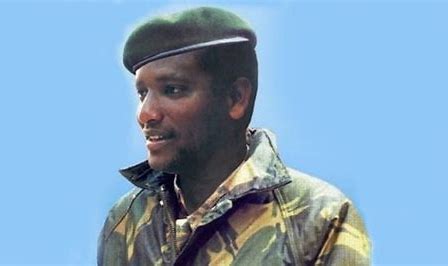
Aha! When they constitutionally created a group called “Banyarwanda” as a new Indigenous Group of Uganda in the Constitution of Uganda 1995, using some indigenous Ugandans to endorse the move as members of the Constituent Assembly (CA), many of the Rwandese such as Paul Kagame and Fred Gisa Rwigyema were still high-ranking officers of the new National Resistance Movement /Army (NRM/A) administration.
For starters, Fred Gisa Rwigema (sometimes spelt as Rwigyema, was born Emmanuel Gisa on April 10, 1957 and died on October 2, 1990. Rwigyema was a Rwandan politician and military officer. He was the founder of the Rwandan Patriotic Front (RPF), a political and military force formed by Rwandan Tutsi exiled in Uganda.
They made sure that Ugandans pay for their having participated in the so-called liberation war by losing their citizenship, sovereignty, nationality, independence and ownership of their country to the new the “Indigenous Group” with the passage of time.
They did not capture only the instruments of power. They captured the state, citizenship, sovereignty, nationality, independence and ownership of Ugandans. They even captured the politics of the country and it is politics that makes decisions – good and bad.
To ensure that Ugandans, who were there when the instruments of power changed hands between the British colonial government and the new Black administration of the initially Common Realm of Uganda and their descendants, become foreigners in their own country and surrender everything to them, they have used many tools: the Constitution they made, which favours them; impoverishment; green land grabbing; obnoxious, disemboweling laws; de-intellectualisation; de-radicalisation; domestication; exclusion; brutality, political ethnicisation, et cetera.
Academics must strategise to do relevant research using a team, rather than individualized, research approach to provide us with emancipating knowledge.
If access to a national identity card (ID) is going to be so difficult for poor Ugandans to access, yes it means the poor are being decitizenised, de-sovereignised and foreignised as ‘we are sleeping with open eyes.
We must ask: who possesses power in Uganda today? Who is in charge of the national ID scheme? What are our descendants of the Ugandans that received the instruments of power in 1962 doing in Parliament?
Have Ugandans as a totality agreed to belong nowhere in the 21st century? Already, Ugandans have been dispossessed and displaced from their ancestral lands by people who originally belonged to arid and semi-arid areas and who are attached more to grass and cow than the land.
A constitution that was made for us, as our own people were sleeping only allow us to occupy and temporarily occupy the surface of the land. The underground of our dwelling places is constitutionally grabbed by those in power and who came in uninvited with someone me ending up overthrowing the government of Juvenal Habyarimana in Rwanda.
We now know that Uganda is alone huge mine, with a diversity natural resources such as oil, gold, rare Earth minerals, bauxite, etc. We are totally dispossessed by the government whose transparency and accountability to the people is minimal and diminishing every other year.
I cannot end this discourse without rebuking our elites who are more interested in acquiring paper qualifications than using the knowledge they have to genuinely liberate us from a worse imperialism than the British imperialism we endured for 70 years. I was born on July 27, 1949 under British Imperialism. With our people so docile, I will leave when the new imperialism – call it black imperialism has been around for at least 38 years. Already we have apartheid-like education, apartheid-like health services, apartheid-like employment, apartheid-like public services, apartheid-like administration and apartheid-like allocation of national resources.
It was better at British colonial rule. Local administrations were fully in control of their affairs. They had sovereignty over the taxes they collected because they were meant to make them effective and least dependent on the Centre.
But today local administrations are completely disempowered, with some administrators in the form of resident district commissioners (RDC) being like occupation administrators. Local administrations collect taxes but the taxes have to be sent to the centre to decide how much is given to them to provide services to the people.
Quite often when the centre sends them money it does so very late and illogically. Many are unable to use it in the little time they have; and so it goes back to the centre. What it does when it goes back only God knows.
Therefore, Ugandans have lost everything to people whose interests are averse to theirs. Ask any Ugandans who has his or her brain working and he or she will tell you:
- We have lost the power of decision-making at the periphery and the centre.
- We have lost our country to people from elsewhere
- We have lost our collective future to people from elsewhere
- We are losing our land to people from elsewhere
- We have lost the leadership and governance of our country to people from elsewhere
- We are losing Ugandanness or nativeness to people from elsewhere
- We have lost quality education to people from elsewhere
- We have lost quality health to people from elsewhere
- We have lost quality food to people from elsewhere
- We have lost employment to people from elsewhere
- We have lost citizenship, nationality, sovereignty, independence and ownership of Uganda to people from elsewhere
- We are losing our natural resources to people from elsewhere
- Our world is now a world of domestic and external slavery
- Our Children and Grandchildren – who would have been the future Ugandans are bound to be the slaves of Uganda and the World, for the future has been robbed from them.
For God and My Country.
A Tell report / By Prof Oweyegha-Afunaduula, a former professor in the Department of Environmental Sciences of the Makerere University, Uganda











